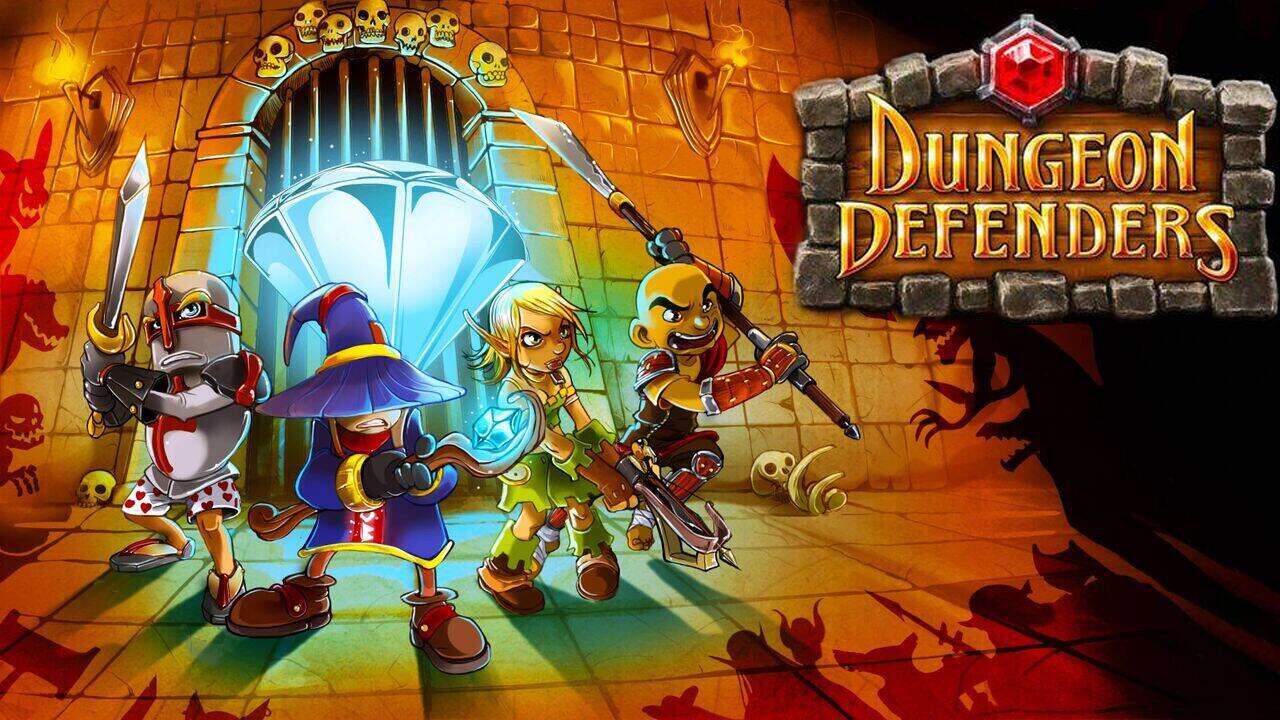Key Highlights
- Dungeon Defenders attempts to blend tower defense with RPG elements, but the execution leaves much to be desired.
- The game features four character classes, each with unique abilities and towers, but their balancing seems questionable at best.
- Multiplayer is emphasized, yet the game lacks proper mechanics for coordination, leading to chaotic and often frustrating experiences.
- A plethora of loot and upgrades sounds appealing on paper, but in reality, it contributes to an overwhelming and convoluted gameplay loop.
- While the visual style might charm some, the repetitive gameplay and questionable design choices overshadow any initial appeal.
Introduction
Dungeon Defenders takes a popular tower defense idea and adds RPG parts to it. Players get to create detailed defenses and fight against many fantasy creatures. However, behind the fun look of the game, there are problems with design and frustrating features. This raises questions about whether trendy entertainment sometimes puts style over quality.
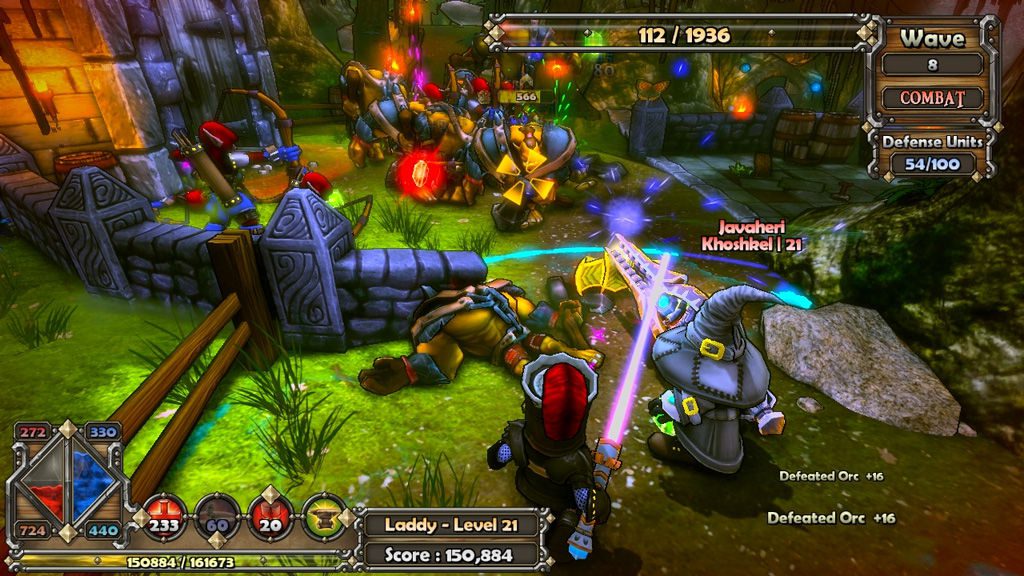
Overview of Dungeon Defenders
Dungeon Defenders is a fun tower defense game mixed with RPG parts. You need to protect Eternia Crystals from enemy waves by setting up traps and towers. The game tries to attract players by offering epic loot, a hardcore mode, and the chance to conquer the “Eternia Gauntlet.”
But, the initial fun fades when you play more. The gameplay feels simple at first, but it turns into a boring cycle of gathering resources, difficult tower upgrades, and awkward controls. The challenge level varies too much. You may find some waves too easy and suddenly face tough ones that are hard to manage.
The core gameplay mechanics explained
Dungeon Defenders is mainly a tower defense game. You build towers, kill enemies, collect experience points, upgrade, and do it all again. However, the game adds too many extra features, making it complicated. Loot drops a lot, and each item comes with its own stats and upgrade choices.
You have to manage the attack rate, range, and damage types for each tower. At the same time, you need to keep track of character abilities and loot. This can become very confusing. The game’s interface doesn’t help. It often hides important information deep within menus. It feels like the developers tried to add every feature possible, which hurt how clear and smooth the game feels.
This cluttered design also shows in combat. Even when you gain experience and level up your characters, it doesn’t feel very meaningful. The enemies can take a lot of damage, needing too much firepower to defeat, even on normal difficulty.
Unique features that set it apart from other tower defense games
Dungeon Defenders wants to stand out in the busy tower defense world. It does this by adding:
- RPG-like character growth with four unique classes.
- A tricky loot system that has randomly generated items and ways to upgrade.
- “Eternia Shards,” which is a special currency to unlock cosmetic items and is claimed to affect gameplay.
However, these ideas can weigh down the game. The character growth does not feel rewarding. It doesn’t really change your strategy much. The loot system adds more confusion rather than depth. As for “Eternia Shards,” they mainly remind you that the developers wanted a grinding currency system, even if it was not needed. The Summoner class could have been fun, but it ends up boring because of tough controls and bad AI.
Detailed Analysis of Game Modes
Dungeon Defenders has different game modes. You can play the basic Campaign mode, try Survival mode for nonstop hordes, or enjoy multiplayer chaos. Each mode aims to add something new to the gameplay, but the same basic problems are still there.
Campaign mode quickly feels boring and repetitive. Survival mode turns into a challenge of patience instead of skill. Even multiplayer does not help resolve the main issues. In fact, it makes things worse, changing what should be teamwork into a messy fight with lots of button pressing.
Campaign mode and its challenges
The Campaign mode tries to show a clear path through levels that get harder and harder. Each level has its own challenges, pushing players to change how they play and tackle the “ruthless difficulty” the developers talk about. But often, this “difficulty” comes from unfair challenges instead of smart level layout or fun enemy types.
The challenge maps are meant to test your skills, but they often feel like boring tasks added just to make the game last longer. Rather than giving you exciting situations, they usually just hit you with too many enemies or random rules about where you can put your towers. In the end, the Campaign mode feels less like an epic adventure and more like a tiring walk toward a disappointing ending.
The excitement of Survival mode
Survival mode, as its name suggests, puts you against endless waves of enemies. Your goal is to get the highest wave count possible. The game offers a thrilling experience as you fight off tougher groups trying to steal your Etheria crystals.
Still, the experience is not as exciting as it sounds. The mode turns into a boring grind very quickly. There’s not much change in the types of enemies or strategies you can use. It feels less like a test of skill and more like a challenge to see who can handle the same gameplay for longer.
The chance to see your name on leaderboards might attract some players. However, the lack of variety and the repetitive fights make Survival mode a forgettable experience.
Teamwork in Multiplayer mode
One would think that a game focused on multiplayer would do well in teamwork and coordination. Sadly, Dungeon Defenders does not succeed in this area. You can join games with friends or new players, but the game offers very few ways to communicate effectively.
Because there is no voice chat in the game, players must use outside programs like Discord. This makes it harder to work together on defense strategies. Even when players do communicate, the game mechanics can get in the way of good teamwork. The fast-paced battles and the confusing way to place towers often cause players to get in each other’s way more than they do with the enemies.
Instead of improving the game, multiplayer in Dungeon Defenders highlights its problems. It turns what could be a teamwork experience into messy and frustrating matches.
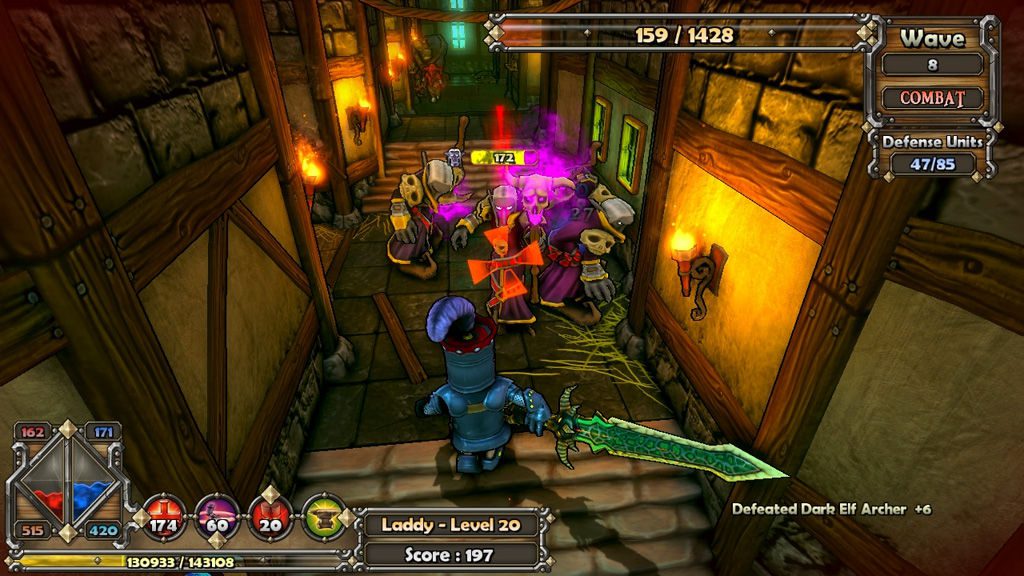
Character Classes and Customization
Dungeon Defenders has four different character classes. Each class comes with its own towers and abilities. Players can customize their experience from stats to a wide loot system. This seems exciting at first. But when you look closer, the depth disappears.
The character classes seem different on paper. In reality, though, they often don’t feel special. Changing stats doesn’t really change how you play the game. The loot system has many options, but it can quickly get tiring to keep track of.
A closer look at the four main classes
The four classes—Squire, Apprentice, Huntress, and Monk—each have a unique style of play. The Squire focuses on close combat and setting up towers. This class is great for those who like to get involved in the action. The Apprentice is all about long-range attacks and hitting many enemies at once. The Huntress uses traps and ranged attacks nicely. The Monk, though, uses tricky aura abilities.
Yet, all these different styles come back to the same basic actions: place a tower, upgrade a tower, and do it again. The Huntress’s traps offer a new twist, but the core gameplay stays pretty similar. The teamwork that you might expect from different classes does not always work well because combat can get confusing. Also, the communication tools aren’t the best.
The Monk could have been more fun to play. His aura abilities seemed interesting at first, but they are difficult to use. The controls are not smooth, and it can be hard to see how far the effects reach.
Customization options for characters
Dungeon Defenders aims to draw in players by offering many ways to customize characters. You can assign stat points and use a loot system full of randomly generated items. The game seems to want players to make their ideal defender. However, this depth is lost in the complicated setup. The stat system has small increases that hardly change the gameplay.
The loot system does not help much either. It overwhelms players with too many similar items. Even when it comes to DLC, which usually brings fresh content, it does not deliver here. Instead of providing meaningful updates, the DLC mainly offers cosmetic items and small adjustments that do not solve the main problems with the game.
The impact of character choice on gameplay
Dungeon Defenders offers many classes and ways to customize, but these options don’t really change how you play. You can focus on certain towers or specific stats, but the main game scene stays mostly the same: build, upgrade, and do it all again.
The game adds different types of enemies to push players to think strategically, but you usually don’t need to change how you play. No matter which class you pick or how you build your character, you’ll often use the same basic strategies.
This lack of real change from your character choice shows a major problem in Dungeon Defenders’ design. It focuses more on repeating tasks for loot and levels, instead of making smart choices. This makes what could be a fun experience feel like a boring cycle.
Graphics and Sound Design
Dungeon Defenders tries to hide its problems with bright and colorful graphics. The character designs are cute but feel a bit old. The game world looks nice at first, but it soon becomes boring and lacks creativity. Unfortunately, the sound design isn’t good either.
The music plays on repeat and becomes annoying, while the sound effects feel weak even though they work. Overall, the game doesn’t feel finished, making it seem like graphics were more important than creating a smooth and engaging sound experience.
Visual style and its appeal
Dungeon Defenders uses a bright and cartoon-like art style to attract players. The characters look cute at first with their silly designs and big shapes. But as you play longer, this charm fades away.
The settings have bright colors, but they feel plain and repetitive. You will walk through the same basic castles and forests. There is not much difference between the levels. The flashy visual effects, meant to make combat exciting, often end up being too busy. They hide what’s happening instead of making it better.
Some players might enjoy the fun style the game tries to show. But overall, the design feels rushed and not finished. Instead of making the game better, the looks remind you of what it could have been.
Soundtrack and sound effects review
The audio design in Dungeon Defenders doesn’t really improve the average gameplay. The music starts off fun but becomes tiring and annoying quickly. After hearing the same basic fantasy tune for the hundredth time, you’ll probably want to hit the mute button.
The sound effects are okay but feel weak. Explosions sound low, and enemy attacks don’t have enough impact. Overall, the sound feels flat and unoriginal. There isn’t much attention to detail in the sound design, which shows a lack of polish in Dungeon Defenders. It’s a mix of average sounds and forgettable music, creating a boring audio experience.
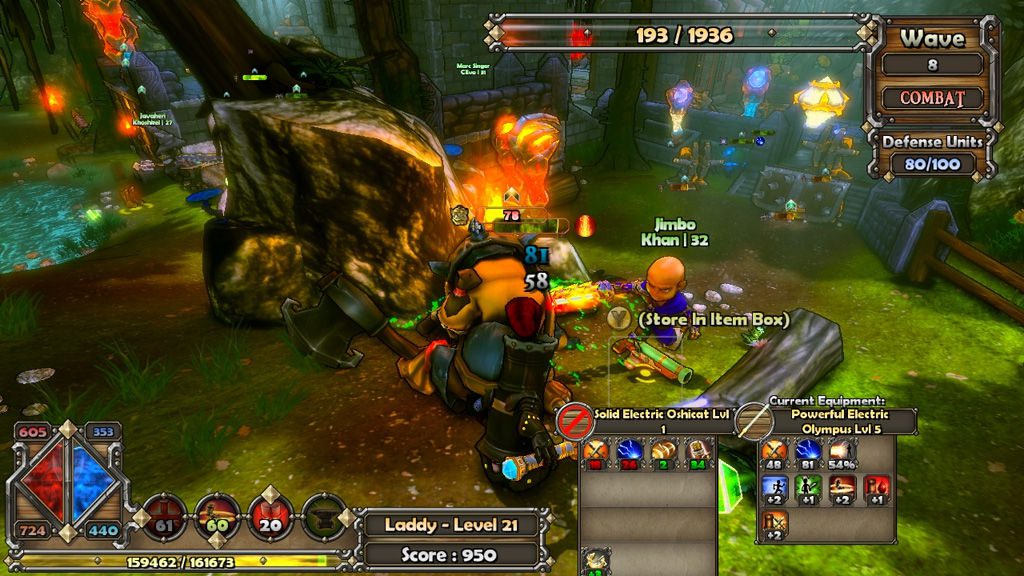
Dungeon Defenders’ Replayability
Dungeon Defenders tries to keep players coming back by promising endless fun. It lures you in with chances to unlock every character, find rare loot, and take on the tough Survival mode. However, this promise quickly feels untrue.
The main way you play the game is fun at first, but soon it becomes boring and too similar. The loot system does not really give you good rewards. Instead, it just gives you a lot of items that feel the same. The multiplayer mode suffers because you can’t easily talk to others. The chaotic gameplay makes it less enjoyable. The idea of interacting with the community feels empty, leaving you feeling hollow even after you finish the final challenge.
Factors contributing to its replay value
Dungeon Defenders tries to make you want to play again with things like challenge maps, Hardcore mode, and the thrill of finding great loot. But these ideas feel shallow. They don’t really fix the main problems with the game.
Challenge maps do not give real, unique challenges. They just make you play the same levels again with some random rules or tougher enemies. Hardcore mode might seem fun for people who like a challenge, but it just makes the game’s problems worse. It turns difficult parts into big walls of frustration.
Looking for better loot, which is common in many RPGs, doesn’t work well here. There are many random items, but the differences in stats are not exciting. This makes the search for new gear feel boring and unfulfilling.
Community and multiplayer aspects
Dungeon Defenders aims to build a community through its multiplayer feature. It encourages players to work together and tackle the game’s challenges. However, this idea does not match the reality of the game.
The absence of in-game voice chat means players have to use other software like Discord. This adds extra trouble to communication. Even when players do communicate well, the fast-paced and chaotic gameplay often brings more frustration than fun. Problems like friendly fire, messy tower placement, and a lack of strategy turn cooperative play into a frustrating mess of miscommunication and unintentional mistakes.
The community, which was once passionate, has faded as the game’s issues became clear. Now, the multiplayer experience feels empty and lacks the sense of friendship it wants to create.
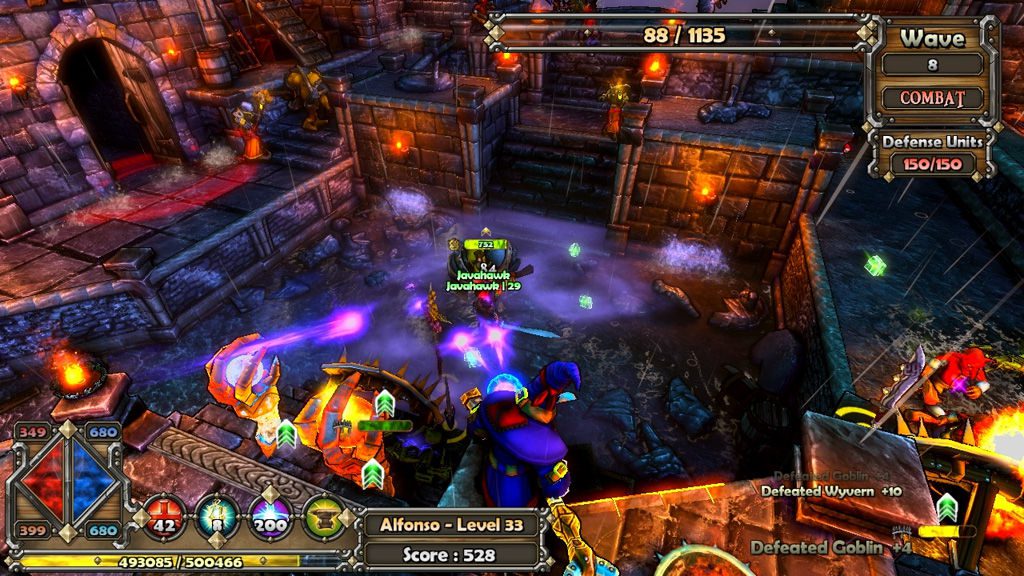
Conclusion
In the world of gaming, Dungeon Defenders does not offer a truly exciting experience. Even though it tries to be different, the game has trouble standing out among many tower defense titles. The basic gameplay is not very deep, and the character classes don’t feel creative. The graphics and sounds are okay but do not improve the overall experience. The game does not have much replay value. It depends too much on repeating the same things instead of providing fun challenges. In a genre full of new ideas, Dungeon Defenders does not make a lasting impact or bring anything new.
Frequently Asked Questions
Can Dungeon Defenders be played solo effectively?
Dungeon Defenders can be played alone, but it is much easier with friends. The game is much harder when you play by yourself. You often need to grind a lot and follow very specific strategies to win, whether you are on PC or using the app.
What are the system requirements for Dungeon Defenders?
The text does not mention the exact system requirements for PC. However, it does say that the game is available on PC, Playstation, and Xbox. This implies that the game likely runs on a range of basic to moderate specs at the time it was released.
Are there any expansion packs or DLCs available?
The information we have shows that there is DLC for Dungeon Defenders. We do not have many details, but the mention of “Eternia Shards” hints that the DLC may be related to extra content or purchases in the game.
